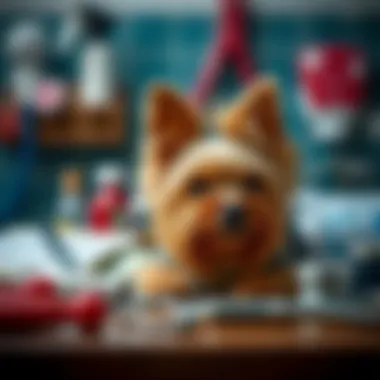Understanding the Costs of Yorkshire Terrier Ownership


Intro
Bringing a Yorkshire Terrier puppy into your life is not merely an emotional choice, but one that requires a sound financial plan. The journey begins long before the puppy takes its first steps in your home. Understanding the money needed upfront, as well as what comes after, can save prospective owners from unpleasant surprises down the line.
Yorkshire Terriers, infamous for their charming personalities and adorable looks, hastily steal hearts, but their acquisition and care can present substantial monetary responsibilities. To navigate these waters requires more than just love; a keen understanding of the financial elements at play is vital.
In this article, we’ll dive into every nook and cranny of the financial landscape related to acquiring a Yorkie. Whether you're contemplating your options or already on the path to ownership, grasping the full breadth of costs involved can make all the difference in ensuring a joyful experience with your new companion.
Foreword to Yorkshire Terriers
When it comes to the charming world of companion animals, Yorkshire Terriers undeniably stand out. Understanding this breed is crucial for anyone considering adding a four-legged friend to their lives. This section serves as a foundation for deeper exploration into the financial aspects of acquiring a Yorkie puppy. By grasping the breed's characteristics, traits, and growing popularity, potential owners can better prepare themselves for the responsibilities and investments involved.
Breed Overview
Yorkshire Terriers, often affectionately called "Yorkies," are small but mighty dogs known for their vibrant personalities and distinctive coats. With origins tracing back to the 19th century in England, they were initially bred to catch rats in clothing mills and mines. Their long, silky hair and playful demeanor have evolved them into beloved companions rather than mere working dogs.
One key element to consider is that Yorkies are a toy breed, typically weighing around 4 to 7 pounds. This petite size makes them suitable for various living situations, including apartments or smaller homes. Yet, what they lack in stature, they make up for with energy and spirit. Their strong-willed nature means that early training and socialization communication is vital for a well-mannered dog. Here are a few noteworthy characteristics that add to their charm:
- Affectionate Nature: Yorkies thrive on companionship and are known to form strong bonds with their owners.
- Intelligence: They are quick learners, but their stubbornness can sometimes prove challenging during training.
- Vocal Tendencies: Known for their alertness, Yorkies can be quite vocal, often barking at unfamiliar noises.
Understanding these breed traits provides insight into the commitment required to care for a Yorkshire Terrier. Beyond the cuddles and cuteness, it’s essential to recognize their specific needs as this will influence both initial and ongoing costs.
Popularity and Demand
Yorkshire Terriers have seen a meteoric rise in popularity over recent years, landing them among the favorite companion animals for many families and individuals. A comprehensive look at various factors reveals why these little dogs have captured the hearts of so many.
- Social Media Appeal: Thanks to their delightful looks and playful antics, Yorkies often dominate pet social media accounts. This visibility leads to increased demand from prospective owners.
- Celebrity Endorsements: A number of famous personalities are known for their love of the breed, further boosting their appeal in the eyes of the public.
- Adaptability: Their ability to adapt to various living environments continues to make them a sought-after choice, appealing to both young and elderly potential owners alike.
"The more well-known they become, the higher the price tag tends to soar, making it crucial for enthusiasts to understand the market before diving into ownership."
As Yorkies continue to gain traction, the financial landscape for acquiring one reflects this popularity. Understanding these trends can help guide potential buyers in making informed decisions, particularly concerning the initial and ongoing financial commitments that come with bringing a Yorkshire Terrier into a home.
Initial Purchase Costs
When considering the financial obligation of bringing a Yorkshire Terrier into your home, understanding the initial purchase costs is a significant aspect. It serves as the first hurdle prospective owners face when deciding on adding a new furry companion. This section elaborates on how various elements contribute to the overall cost, while also shedding light on the importance of selecting the right approach to purchase.
Average Price Range
When looking to acquire a Yorkshire Terrier, the average price range usually fluctuates significantly, typically falling between $1,200 to $3,500. This wide range reflects the variability in several essential factors that buyers must consider. For instance, many reputable breeders place considerable emphasis on the lineage and health of their dogs, and understandably so. A higher price tag often correlates with the assurance of a well-bred puppy, which can save owners from potential pitfalls later on.
In contrast, low-cost options may suggest that the seller is cutting corners or perhaps not prioritizing responsible breeding practices. While a lower price may catch your eye, it’s crucial to remember that what appears to be a bargain can sometimes come with hidden costs.
Factors Influencing Price
The factors influencing the price of a Yorkshire Terrier puppy are multifaceted; understanding them will enhance the buying decision and can impact long-term satisfaction with ownership.


Pedigree and Lineage
Pedigree and lineage play a pivotal role in determining the cost of a Yorkshire Terrier. Dogs from champion bloodlines or renowned breeding lines often come with a heftier price tag. The key characteristic of pedigree is that it not only reflects the aesthetic qualities of the dog but also its genetic health. A Yorkie that comes from a solid lineage may be less prone to health issues that could arise from poor breeding practices.
On the flip side, potential owners must weigh the benefit of a well-bred puppy against the financial outlay. The unique feature here lies in the peace of mind it affords owners, knowing their puppy is bred under proper conditions. However, this also leads to a more significant initial investment.
Geographical Location
The geographical location of the sale can heavily influence purchase prices. Areas with a higher cost of living, such as urban centers, tend to present higher price points for Yorkie puppies. The key characteristic here is that the market directly reflects local demand. Buyers in these regions often encounter a competitive atmosphere, which can drive prices upwards.
What's notable is that geographical locaiton can also affect the availability of reputable breeders. In some regions, you may find that your options for high-quality puppies are considerably fewer, persuasively leading owners to invest more heavily to secure the right pup. Thus, buyers have to carefully consider their surroundings and the implications for the overall cost.
Reputable Breeders vs. Backyard Breeders
The debate surrounding reputable breeders vs. backyard breeders is critical in shaping both the welfare and cost of Yorkshire Terriers. Reputable breeders, who often focus on best breeding practices, health screening, and proper socialization, tend to charge more for a puppy due to these added responsibilities. The characteristic of these breeders is their commitment to maintaining breed standards and promoting healthy dogs, which undoubtedly leads to higher initial purchase costs.
In contrast, backyard breeders often cut corners to save costs. The price may be tempting, but potential buyers should tread carefully. The unique feature of such breeders is the potential risk of hereditary health problems and behavioral issues arising from improper breeding practices. Therefore, while the allure of savings with a backyard breeder may seem attractive, it often comes with the risk of greater expenses down the line, such as veterinary bills.
"Investing in a reputable breeder is often an investment in the longevity and well-being of your pup."
In summary, initial purchase costs are a vital aspect of understanding the financial commitment involved in acquiring a Yorkshire Terrier. Keeping an eye on factors such as average pricing, pedigree, geographical location, and breeder reputation can help prospective owners navigate this important step toward responsible pet ownership.
Hidden Costs Associated with Yorkie Puppies
Acquiring a Yorkshire Terrier puppy is often seen as a joyful leap into pet ownership. But, beneath the surface bliss of puppy cuddles lurks a tangled web of hidden costs that can catch first time owners off guard. Understanding these costs is crucial to getting a full picture of the financial commitment you're making. It's not just about the purchase price; it’s about what happens after the puppy is home.
Veterinary Expenses
Veterinary care is a foundational element of responsible pet ownership. It’s not just a box to check off; it’s an ongoing responsibility with financial implications that can add up significantly over time.
Vaccinations
Vaccinations stand as a fundamental shield against various harmful diseases like parvovirus and distemper. These are essential for your puppy's development and are usually spaced out over the initial months of their life. While the upfront cost of vaccinations may seem reasonable, remember that the frequency can be quite demanding in a new pet owner's budget.
Not only do vaccinations protect your furry friend, but they also prevent outbreaks within the community, leading to a healthier pet population overall. However, be advised that some puppy owners may overlook this cost in a bid to save money when, in fact, they’re setting themselves up for higher expenses down the line due to treatment for illnesses that could have been prevented.
Spaying/Neutering
Spaying or neutering your Yorkie is another pivotal expense that should not be brushed aside. It's not just a matter of preventing unwanted litters; there are health benefits tied to these procedures, such as reduced chances of certain cancers. The costs here vary widely based on geographical location and the facility, but it’s often a necessary step for responsible ownership. Taking the plunge can bring some initial financial sting, but in the long run, it discourages behavioral issues associated with unaltered pets. One downside is that in some cases, there may be additional costs if complications arise post-surgery, so it’s wise to budget conservatively.
Routine Check-Ups
Routine veterinary check-ups are like a necessary tune-up for your pup. They allow for early detection of issues and ensure your dog stays in tip-top shape. While the costs might feel repetitive, preventative care is always cheaper than treating a major illness later on. Developing an annual check-up habit not only monitors your dog’s health but also fosters a bond with your vet, who can help spot any underlying health issues that might cause bigger problems down the road. Remember, neglecting these visits can lead to costly treatments, making it more of a hassle than an expense you can avoid.
Food and Nutrition
Quality nutrition is not just a passing thought; it’s a long-term commitment that feeds into the overall well-being of your Yorkshire Terrier. The food you choose plays a crucial role in your pet’s health and lifespan, impacting your finances significantly.


High-Quality Dog Food
The first choice you must make is the food you provide. High-quality dog food may come with a heftier price tag when compared to the store brands, but it’s an investment in your puppy’s health. Foods rich in proteins and essential nutrients contribute to longevity, lessening the chances of future health issues due to poor diet. Sure, you could opt for cheaper brands, but that's a slippery slope that might save you a few bucks now but costs you down the road, possibly through vet bills.
Special Dietary Needs
If your Yorkshire Terrier develops specific dietary needs—be it allergies or digestive issues—the costs can skyrocket. Custom diets or specialized kibble can cost significantly more than standard options. This aspect is unpredictable and can feel like a financial black hole. However, ensuring that your pet receives the proper nutrients is crucial; in some cases, it can lead to fewer health complications and lower vet bills later. It’s wise to consult your veterinarian for guidance on navigating any special dietary concerns.
Grooming Requirements
Yorkshire Terriers boast long, beautiful coats, but with that beauty comes another layer of ongoing expenses: grooming. Regular grooming isn’t just about aesthetics; it’s also about health. It prevents matting and skin issues, which can escalate if ignored.
Regular Grooming Sessions
Deciding to take your dog to a professional groomer is a considerable part of the picture. Grooming sessions can range widely in cost, depending on location and the range of services provided, such as baths, trims, and nails. It’s essential to budget for these sessions long-term, as neglecting them can lead to health repercussions for your puppy. Some owners might think they can do it themselves, but not everyone is cut out for the task, and it could also lead to mistakes that cost more in the end.
Tools and Supplies
If you decide to handle grooming yourself, don’t forget to invest in quality tools such as brushes, shampoos, and clippers. One-time purchases can accumulate into a decent-sized expense. Keep in mind that the grooming world is evolving, so tools can also become outdated, pushing your budget further. Nevertheless, having the right supplies can save you from frequent trips to the groomers, a financially savvy choice for hands-on owners.
Training and Socialization Costs
When one embarks on the journey of bringing home a Yorkshire Terrier puppy, it’s easy to get lost in the financial whirlwind of initial costs. However, it’s crucial to understand that the expenses don’t end after you’ve made the purchase. The Training and Socialization Costs can be just as impactful, if not more so, on your budget and your puppy’s overall well-being. This section sheds light on why investing in training and socialization is not just a good idea, but a necessary step for your new companion.
Proper training builds a strong foundation for your Yorkshire Terrier’s behavior, enabling smoother interactions both at home and in public. It can mitigate potential behavioral issues like barking, biting, or anxiety. After all, nobody wants a rambunctious pup running amok at the local park. Effective training sets boundaries and teaches your Yorkie how to navigate their world confidently.
Additionally, socialization is an equally pressing aspect of early development. Exposing your Yorkie to a variety of situations, people, and other animals helps them grow into a well-adjusted adult dog. This process reduces the probability of fearful responses to unfamiliar stimuli later in life, ensuring a harmonious environment for both the dog and its human companions. Overall, investing in these areas not only fosters a solid relationship between you and your Yorkie but can also save you from costly behavioral issues down the line.
Puppy Training Classes
Puppy training classes are an excellent starting point for new Yorkie owners. While they have a fee—typically ranging from $150 to $300 depending on the duration and reputation of the trainer—they provide a structured environment for your puppy to learn essential commands and social skills.
These classes often cover fundamental behaviors, such as sit, stay, and come, giving your pup the tools to communicate effectively with you and others. Moreover, training classes not only engage your Yorkie’s mind but also help to reinforce the owner’s role as a leader. It solidifies the bond between you and your pup while teaching you how to manage any quirks that your Yorkshire Terrier may have, particularly given their spirited nature.
Benefits of Puppy Training Classes:
- Professional guidance from experienced trainers.
- Socialization opportunities with other puppies, which is crucial for developing confidence.
- Achieving a sense of community with fellow dog owners who share similar challenges and successes.
It’s worth noting that some training centers may also offer pedigree-specific courses, which can particularly benefit the Yorkshire breed if focused on their unique behavioral tendencies.
Socialization Activities
Once your Yorkie has had a taste of basic training, incorporating socialization activities into their routine is essential. This stage does involve certain costs as well, but the rewards far outweigh the initial investment.
Socialization can take many forms:


- Dog parks: A cost-effective way to let your pup mingle with other dogs and learn through play. However, make sure to supervise interactions closely, especially since Yorkshire Terriers tend to be smaller than many other breeds.
- Pet-friendly events: Many communities host dog-friendly gatherings or pet expos. These experiences can be invaluable for exposing your Yorkie to new sights, sounds, and smells, further solidifying their adaptability.
- Meet-ups with other dog owners: Organizing playdates with local Yorkies or similar dog breeds can help normalize various canine behaviors and promote a well-rounded temperament.
Research suggests that socialization must begin early in a puppy’s life—ideally between 3 to 14 weeks of age—to maximize the benefits and minimize the chances of behavioral issues in adulthood.
In summary, investing in training and socialization for your Yorkshire Terrier puppy is more than just spending money; it’s about building a solid foundation for a lifetime of companionship. Understanding and preparing for these costs provides a comprehensive picture of what it truly entails to welcome a Yorkie into your home.
Long-Term Financial Commitments
Acquiring a Yorkshire Terrier is a delightful journey, but it’s essential to understand that commitment goes beyond the initial price tag. A Yorkshire Terrier isn’t just a pet; they’re a family member, and treating them as such often comes with significant long-term financial responsibilities. The investment you make in a Yorkie is both monetary and emotional, and budgeting wisely ensures you create a stable environment for your furry friend.
Life Expectancy and Health Considerations
Yorkshire Terriers typically live anywhere from 12 to 15 years, sometimes even longer with the right care. This longevity means you are signing up for over a decade of canine care, which naturally brings ongoing costs. A healthy lifestyle for your Yorkie involves maintaining regular vet check-ups, vaccinations, and a balanced diet. On top of all this, knowing that this breed can be prone to health issues such as dental diseases, patellar luxation, and liver shunts can guide owners to allocate a portion of their budget specifically for health care.
Ongoing Care Costs
Owning a Yorkshire Terrier comes with consistent expenses. The everyday needs of this breed encompass more than just food and water; it stretches into the realm of routine care that keeps them healthy and happy.
Insurance Options
Pet health insurance can be a game changer for Yorkie owners. Policies vary widely, but typically, they can cover a significant portion of veterinary costs. Investing in insurance offers peace of mind as it helps mitigate unmanageable expenses when facing unexpected health issues. One pivotal aspect of insurance is its ability to cover illnesses and accidents, ensuring that if your Yorkie needs emergency care, you won’t be scrambling financially. However, keep in mind that some policies have exclusions and breed-specific limitations, which might not cover certain hereditary conditions — doing due diligence before choosing a policy is vital.
Emergency Care and Unexpected Expenses
No one anticipates emergencies, but they can arise at the most inconvenient times. Emergency care for your Yorkie can incur hefty costs, from sudden illnesses to mishaps requiring immediate veterinary attention. Setting aside a "just in case" fund is akin to having a safety net. This fund can save you from financial strain in scenarios where your furry friend may need urgent care without delay. Alongside emergency situations, consider the potential for additional unexpected expenses, like travel or moving, which can necessitate temporary daycare for your pup.
Budgeting for Your Yorkie
When it comes to budgeting for your Yorkshire Terrier, anticipating these long-term financial commitments is vital. Here’s a quick outline to keep handy:
- Initial Purchase Cost: Depending on the breeder and lineage.
- Healthcare: Veterinary visits, medications, and insurance premiums.
- Nutrition: Quality dog food and dietary supplements if needed.
- Grooming: Regular grooming visits and supplies.
- Training: Classes for behavioral training and socialization sessions.
- Emergency Fund: Money set aside for unexpected events.
Adopting this budgeting mindset will help you navigate these financial waters smoothly. No one wants to find themselves in a tight spot, worrying about how to afford necessary care for their beloved Yorkie. By planning appropriately, you can ensure a happy, healthy home for both you and your puppy.
The End
Choosing to welcome a Yorkshire Terrier into your life is not merely a whimsical decision; it carries significant financial implications that stretch beyond the initial purchase cost. Understanding these financial aspects is vital for anyone considering making such a cherished addition to their household.
Making an Informed Decision
Before committing to a Yorkshire Terrier, it’s crucial to equip yourself with clear knowledge. This involves researching the various costs, both hidden and evident, associated with their care. Key considerations include:
- Initial Costs: Factor in the price of the puppy itself, which can range anywhere from several hundred to a few thousand dollars depending on the breeder’s reputation and the pup’s lineage.
- Routine Expenses: From quality food to grooming and veterinary needs, having a comprehensive budget can help avert unexpected financial strain.
- Training and Socialization: Investing in training classes is essential, helping to establish healthy behavior patterns right from the start.
As prospective owners delve into these details, they may also want to engage with current Yorkshire Terrier owners through online platforms. Websites like reddit.com can provide heaps of practical experiences shared by real people, offering insights that textbooks often overlook. Gathering this knowledge can aid in crafting a realistic long-term plan.
Final Thoughts on Yorkshire Terrier Ownership
In summation, understanding the financial landscape of Yorkshire Terrier ownership is essential for ensuring a happy and healthy environment for both pet and owner. These delightful little companions require more than just love; they need commitment, finances, and a thoughtful approach to their care.
Owners should embrace the journey ahead, keeping in mind the importance of being well-informed. The serene companionship a Yorkie provides can far outweigh the risks of financial strain, but only if one is prepared to navigate the necessary responsibilities involved. By harmonizing passion with pragmatism, you can facilitate a fulfilling relationship with your new furry friend.
Not every dog fits into every lifestyle, so evaluating your situation against the backdrop of these financial considerations can lead to a more rewarding ownership experience. After all, your furry family member deserves the best life you can offer.















